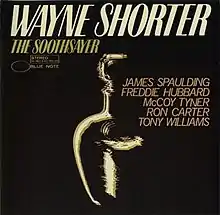The Soothsayer
The Soothsayer is the seventh album by Wayne Shorter, recorded in 1965, but not released on Blue Note until 1979.[1] The album features five originals by Shorter and an arrangement of Jean Sibelius' "Valse Triste". An additional take of "Angola" was added to later CD releases.
| The Soothsayer | ||||
|---|---|---|---|---|
 | ||||
| Studio album by | ||||
| Released | 1979 | |||
| Recorded | March 4, 1965 | |||
| Studio | Van Gelder Studio, Englewood Cliffs, NJ | |||
| Genre | Post-bop | |||
| Length | 50:21 | |||
| Label | Blue Note LT 988 | |||
| Producer | Alfred Lion | |||
| Wayne Shorter chronology | ||||
| ||||
Reception
The Allmusic review by Stacia Proefrock awarded the album 4½ stars stating "it ranks with the best of his works from this incredibly fertile period".[2]
| Review scores | |
|---|---|
| Source | Rating |
| Allmusic | |
| The Rolling Stone Jazz Record Guide | |
| Sputnikmusic | 4/5[4] |
| Tom Hull | B+[5] |
Track listing
All compositions by Wayne Shorter except where noted.
- "Lost" – 7:20
- "Angola" – 4:56
- "The Big Push" – 8:23
- "The Soothsayer" – 9:40
- "Lady Day" – 5:36
- "Valse Triste" (Jean Sibelius) – 7:45
- "Angola" [Alternate Take] – 6:41
Personnel
References
- Wayne Shorter discography accessed August 3, 2011.
- Proefrock, S. Allmusic Review accessed August 3, 2011.
- Swenson, J., ed. (1985). The Rolling Stone Jazz Record Guide. USA: Random House/Rolling Stone. pp. 180. ISBN 0-394-72643-X.
- "Wayne Shorter: The Soothsayer". Sputnikmusic. sputnikmusic.com. Retrieved 7 May 2018.
- "Tom Hull: Grade List: Wayne Shorter". Tom Hull. Retrieved 22 July 2020.
This article is issued from Wikipedia. The text is licensed under Creative Commons - Attribution - Sharealike. Additional terms may apply for the media files.